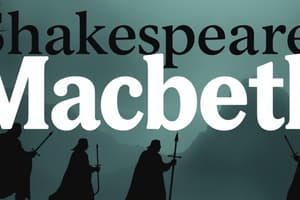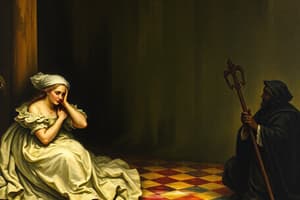Podcast
Questions and Answers
What is the primary source of evil in 'Macbeth' as presented in the content?
What is the primary source of evil in 'Macbeth' as presented in the content?
- Human ambition and desire
- The influence of supernatural forces (correct)
- Natural disasters
- Political intrigue and betrayal
How does Lady Macbeth express her desire for evil in her soliloquy?
How does Lady Macbeth express her desire for evil in her soliloquy?
- By calling on spirits to help her (correct)
- By sacrificing her own happiness
- By asking Macbeth to commit the murders
- By revealing her plans in a letter
What transformation occurs in the language used to describe Macbeth throughout the play?
What transformation occurs in the language used to describe Macbeth throughout the play?
- From noble to traitorous (correct)
- From powerful to weak
- From wise to foolish
- From beloved to despised
What reaction does Scotland experience due to the disruption of the Divine Right of Kings?
What reaction does Scotland experience due to the disruption of the Divine Right of Kings?
What is implied about the nature of evil in Macbeth's mind before encountering the witches?
What is implied about the nature of evil in Macbeth's mind before encountering the witches?
What indicates that Lady Macbeth may possess traits of evil similar to witches?
What indicates that Lady Macbeth may possess traits of evil similar to witches?
Which event illustrates the consequences of Macbeth's evil actions on the natural world?
Which event illustrates the consequences of Macbeth's evil actions on the natural world?
What role do the witches play in the manifestation of evil in 'Macbeth'?
What role do the witches play in the manifestation of evil in 'Macbeth'?
Flashcards
Macbeth's initial evil thoughts
Macbeth's initial evil thoughts
Macbeth's internal conflict and susceptibility to evil influence, as evidenced by his reaction to the witches' prophecies.
Lady Macbeth's desire for cruelty
Lady Macbeth's desire for cruelty
Lady Macbeth actively seeks evil, expressing a willingness to commit brutal acts.
Macbeth's murders
Macbeth's murders
Macbeth's escalating acts of violence against Duncan and others driven by ambition and guilt.
Supernatural influence on evil
Supernatural influence on evil
The witches' role in instigating and amplifying Macbeth's wicked actions and their connection to supernatural events.
Signup and view all the flashcards
Impact of evil acts on nature
Impact of evil acts on nature
Macbeth's wicked acts cause disruptions to natural order and societal harmony, as reflected in strange weather patterns.
Signup and view all the flashcards
Language of evil in Macbeth
Language of evil in Macbeth
Shakespeare's use of potent language and imagery (e.g., forceful imperatives, changing descriptions) to highlight the evil portrayed.
Signup and view all the flashcards
Divine Right of Kings
Divine Right of Kings
The belief, prevalent in Shakespeare's time, that a king's authority comes directly from God, and disrupting it was seen as morally wrong.
Signup and view all the flashcards
Witches' language and evil
Witches' language and evil
The witches' use of rhyme and spells in the play underscores their evil and supernatural nature.
Signup and view all the flashcardsStudy Notes
How is 'evil' presented in Macbeth?
-
Evil in Macbeth is often linked to supernatural intervention; witches show their malevolent intent before meeting Macbeth.
-
The witches' prophecies suggest the seed of evil in Macbeth before his meeting with them.
-
Macbeth's thoughts of murder are evident in his plans to murder Duncan.
-
Lady Macbeth's desires for evil are explicit; she wishes to be filled with cruelty, breaking a promise rather than acting with mercy.
-
Macbeth's first act of evil is the murder of Duncan. This act has far-reaching consequences, affecting Macbeth's family, household, weather & nature.
-
The play presents evil through soliloquies from Macbeth & Lady Macbeth, showing their malicious thoughts.
-
Good and evil are balanced throughout the play; good characters like Duncan and Macduff are contrasted with the evil acts of Macbeth and his wife.
Language & Structure in presenting Evil
- Lady Macbeth uses forceful language ("Come, you spirits") in her soliloquy prior to the murder.
- Language used to describe Macbeth changes from "great" and "good" to "hell kite" and "tyrant".
- Witches' spells and curses emphasize their evil nature through rhyme and rhythm.
Supernatural & Historical Context
- Supernatural powers were believed to exist during Shakespeare's time, influencing those stories.
- Witches were considered evil and persecuted.
- The Divine Right of Kings suggests disruption due to evil affects weather and nature.
Studying That Suits You
Use AI to generate personalized quizzes and flashcards to suit your learning preferences.




